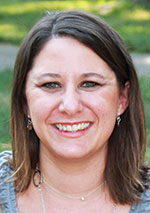Investing with Faith / Jolinda Moore
Making a will offers opportunity to leave a legacy of faith
 “You can’t take it with you.” “Shrouds have no pockets.” Or as the Psalmist says, “Do not be afraid when some become rich, when the wealth of their houses increases. For when they die, they will carry nothing away; their wealth will not go down after them” (Ps 49:17-18). Nobody can be sure who articulated it first, but this truth of human existence has been phrased and rephrased throughout the centuries.
“You can’t take it with you.” “Shrouds have no pockets.” Or as the Psalmist says, “Do not be afraid when some become rich, when the wealth of their houses increases. For when they die, they will carry nothing away; their wealth will not go down after them” (Ps 49:17-18). Nobody can be sure who articulated it first, but this truth of human existence has been phrased and rephrased throughout the centuries.
So, if we can’t take the blessings of this life with us when we depart from earthly existence, what happens? Well, that depends not only on the choices we make, but whether we communicate those choices in a way that guarantees they are actionable. That is what a last will and testament is for.
For many, making a will is always on the to-do list, but it often doesn’t get done. Life is busy. And often things that are important get swallowed up by the flurry of things that are more urgent.
“People procrastinate meeting with a lawyer to prepare an estate plan more than any other important task,” says Jay Mercer, general counsel for the Archdiocese of Indianapolis. That’s why August has been designated National Make-A-Will Month.
Now before you give up because you’re not sure where to begin, consider these three things.
First, a will is an important document that every adult should have. Our last name doesn’t have to be Musk or Bezos to distribute our property as we see fit and protect the people we love when we pass away. More than
one-third of Americans have a will, and that number is growing. Why? Because the process isn’t nearly as long or difficult as many think it is. And because the ability to choose where what we have earned or received goes is empowering.
Second, a will can bring us and our family peace of mind, especially in the event of unexpected loss. “One of the best gifts you can give your loved ones is a well-organized estate plan,” added Mercer. Wills make death easier for all involved. We may not think we own much, but all of what we possess will need to find a new home once we’re gone. When decisions are made and communicated in a legal document, everything goes more smoothly. Wills often put the biggest questions about an estate to rest and help family members avoid chaos, confusion and conflict. And it’s possible to plan ahead for those in our care, such as minor children, elderly parents and even pets.
Third, a will allows us an opportunity to do something good that reaches beyond our lifetime. It’s becoming more and more common for people to create a legacy that makes a difference by designating a charity as a beneficiary of their will.
The Archdiocese of Indianapolis has been blessed by the support of numerous donors who want to share what they have enjoyed in a way that sustains the mission of the Church. The archdiocese has received gifts of cash, securities, stocks, property, and other assets as a designated beneficiary at the time of death.
For many, the uncertainties of life can make us cautious about giving. (Let’s face it, those rainy days we try to save up for do come.) Eventually, we know we will be free of pressing concerns and immediate needs. That’s when we can more freely choose to be generous and leave what we can’t take with us as a gift of compassion to others in need.
If making a will has been on your list of things to do, now is the time to do it. If you’ve already made a will, perhaps it’s time to review it. And if you’d like more information about how to include the ongoing work of the Archdiocese of Indianapolis in your estate planning, we’re here to help.
(Jolinda Moore is executive director of the archdiocesan Office of Stewardship and Development and the Catholic Community Foundation [CCF]. Tax or legal information provided herein is not intended as tax or legal advice. Always consult with your legal, tax or financial advisors before implementing any gift plan. If you would like to learn more about including your parish in your estate plans, please contact us any time. We exist to exclusively serve you and your parish in planned giving. For more information on the CCF, visit www.archindy.org/CCF, e-mail ccf@ archindy.org, or call 317-236-1482.) †
 “You can’t take it with you.” “Shrouds have no pockets.” Or as the Psalmist says, “Do not be afraid when some become rich, when the wealth of their houses increases. For when they die, they will carry nothing away; their wealth will not go down after them” (Ps 49:17-18). Nobody can be sure who articulated it first, but this truth of human existence has been phrased and rephrased throughout the centuries.
“You can’t take it with you.” “Shrouds have no pockets.” Or as the Psalmist says, “Do not be afraid when some become rich, when the wealth of their houses increases. For when they die, they will carry nothing away; their wealth will not go down after them” (Ps 49:17-18). Nobody can be sure who articulated it first, but this truth of human existence has been phrased and rephrased throughout the centuries.